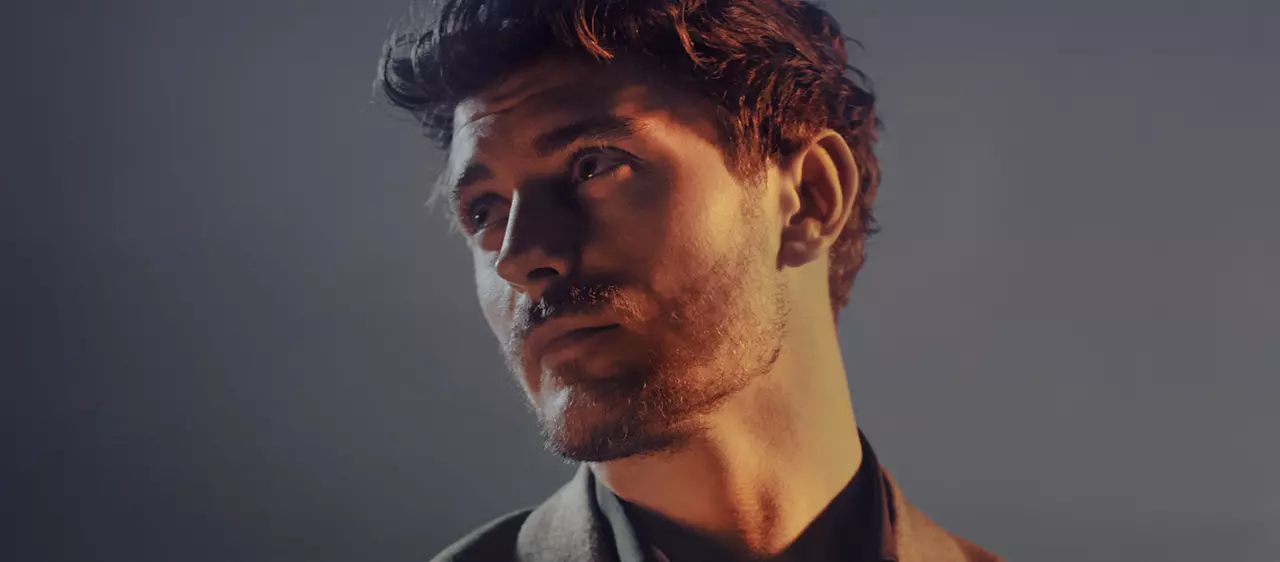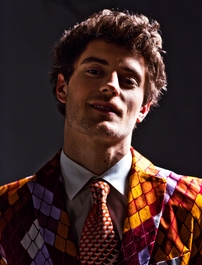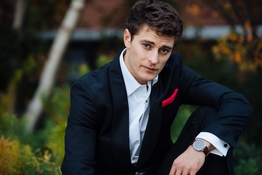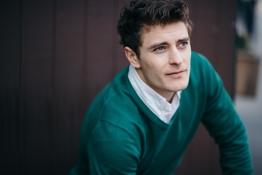

Jakub Józef Orliński
News
Jakub Józef Orliński to explore the Polish art song repertoire on Farewells
With Farewells, Warsaw-born countertenor Jakub Józef Orliński, partnered by pianist Michał Biel, offers a panorama of Polish song that spans 150 often turbulent years. Taking its title from a triptych of songs written in 1948 by Henryk Czyż, the album is often nostalgic in spirit as poetry and music evoke emotions, nature, landscapes and traditions.
Both Orliński and Biel are alumni of the opera academy of Warsaw’s Teatr Wielki and New York’s Juilliard School, and as a recital duo they have become ambassadors for Polish song. The programme of Farewells runs from the 1840s to the 1990s and represents six composers: Stanisław Moniuszko, Mieczysław Karłowicz, Karol Szymanowski, Henryk Czyż, Tadeusz Baird and Paweł Łukaszewski, a leading figure in contemporary Polish music.
Over the last five years, Jakub Józef Orliński has made an impact in music of an earlier period. As he explains: “After recording three albums of mostly unknown baroque music I felt that it was time to record something different … Michał and I started exploring the Polish art song repertoire when we were at the Juilliard School. He suggested I try some Szymanowski songs. Even though I was not on board right away, the idea grew on me, and since that moment we have developed a large range of Polish songs … The journey to this album was not easy and not obvious. I have to say that, as a countertenor, I never thought I would be doing recitals with piano, as opposed to opera or baroque concerts – but I was wrong.
“As a Polish duo we love to present Polish music to our public and over the years of performing around the world, we finally we got to the point where we could sit down, write a concept for an album of song and record it. Travelling so much, and singing so many different pieces, I know that no language can present a barrier when it’s set to music. I believe that music builds bridges and I am sure that those songs will get under the listener’s skin.”
The recording was made using Dolby Atmos technology in the state-of-the-art concert hall of Warsaw’s Nowa Miodowa Music School. Mateusz Banasiuk, the sound engineer for the recording, says that: “The countertenor voice has a specific timbre that was employed in earlier times to spin precise and breathtaking melodic lines. Jakub has used it in a different way, deciding to transpose music for the tenor, baritone or soprano voice to his own countertenor range, something that has opened up a new perspective on the interpretation of Polish song.”
The period that gave rise to the songs on Farewells was often traumatic for Poland, yet its cultural identity remained strong and its creativity continued to flourish. Between 1795 and 1918 Poland did not even officially exist as a unified country, but an autonomous state was eventually established after World War I. In 1939 it was invaded by both Nazi Germany and Soviet Russia, and after terrible suffering in World War II the country found itself behind the Stalinist Iron Curtain. 1956 was an important year for Poland: following widespread protests, there was some loosening of the Soviet grip on the country. This led to a political ‘thaw’ – for a time, at least – but it was not until 1989 that Poland emerged from Communism. In 1990 Lech Wałęsa became the country’s president, and it went on to join NATO in 1999 and the European Union in 2004.
Moniuszko and Szymanowski – the two composers on Farewells who are best known around the world – were both closely associated with the assertion of Poland’s cultural identity. Moniuszko (1819-1872) is known as the father of Polish opera, while Szymanowski (1882-1937) was prominent in ‘Young Poland’, a progressive artistic movement that flourished in the late 19th and early 20th centuries; he draws on folk music in the songs on this album. The short-lived Karłowicz (1876-1909) was also associated with ‘Young Poland’, and his 12 brief songs reflect the heady mood of the art nouveau era. Henryk Czyż (1923-2003) and Tadeusz Baird (1928-81), both active under the Communist regime, consciously evoke earlier times – Czyż in Farewells (Pożegnania), three settings of Pushkin, and Baird in Love Sonnets from Shakespeare. Paweł Łukaszewski (b. 1968) is represented by a single song, Autumn (Jesień). It sets an elegiac depiction of nature by Maria Pawlikowska-Jasnorzewska, (1891-1945), who was celebrated and even notorious as both a poet and dramatist.
The Polish Countertenor reveals his interpretation of Vivaldi's Stabat Mater
Vivaldi’s Stabat Mater, a work associated with Eastertide, sets a powerful and moving 13th century poem which reflects on Mary’s suffering at the Cross. Jakub Józef Orliński first sang it as a student in Warsaw and first performed it in public in 2013, at a festival in northern Poland. Seven years later he recorded it in Kraków with the instrumentalists of Capella Cracoviensis and conductor/organist Jan Tomasz Adamus. It was at the recording sessions that he had the idea of taking this ‘pandemic project’ further by making an extended video to illustrate Vivaldi’s 20-minute score. Erato has now released both the audio recording and an accompanying DVD.
The ‘short feature’ video, masterminded by award-winning director Sebastian Pańczyk, was made by Warsaw-based production company DOBRO, part of the Platige Image group. It does not interpret the words of the Stabat Mater literally, although there are references to religious imagery in the video. Rather, it engages with the theme of empathy that runs through the text: Mary’s empathy with her crucified son, and the reader’s or listener’s empathy with Mary’s suffering.
Set in the present day, the thought-provoking video presents an episodic, enigmatic narrative. Jakub Józef Orliński plays the protagonist, both a suffering human being and the symbol of something more mysterious. At moments the images are disturbing, even brutal, but they are also poetic, especially when evoking the natural world.
Talking about. Anima Aeterna, his album of sacred baroque music released in Autumn 2021, Orliński described nature as “Something so strong and durable … Something so vital, wild, and dangerous, yet also so calm, mesmerizing and healing.” In the “journey of empathy” that the Stabat Mater takes in the video, he sees an analogy between the sacred story of the text and the fate of an allegorical “King of the Forest”, which becomes apparent in the climactic scene of the video, set on the stage of a splendid theatre.
As Sebastian Pańczyk explains: “For some time I had been mulling over ideas related to the interdependence of man and the spirit of nature, and about where we stand in this relationship. The ideas really started taking shape when the opportunity arose to make a visual realisation of the Stabat Mater. It ended up giving much stronger expression to the theme of empathy with nature … From its first moments the Stabat Mater quivers with drama, especially as performed by Jakub Józef Orliński and Capella Cracoviensis. With the concept for the video, my intention was to arouse emotion immediately in the audience. It wasn’t a matter of building it up, but of landing in the emotional space from the opening scene.”
Another key scene, set at a celebratory gathering, is matched to the fifth movement of Vivaldi’s score, ‘Quis non posset contristari’. Here the words exemplify the theme of empathy as they speak of sharing Mary’s pain. In the opening bars of the movement, Vivaldi creates a ‘halo’ of string chords around the alto voice. These are heard on the CD, but in Pańczyk’s video realisation, Jakub Józef Orliński sings his lines completely a cappella – with no accompaniment. The effect is almost painfully dramatic.
Emphasising “how they can touch people’s souls, even today,” Orliński has spoken of “all the shades and colours to be heard in sacred music of baroque era.” This recording of Vivaldi’s Stabat Mater, picks up on the theme established by in 2018 by Orliński’s debut album Anima Sacra. It was continued by Anima Aeterna, which, as Gramophone magazine wrote, affirmed once again that he is “one of the most striking young talents not just in countertenor singing but in baroque music more broadly”.
Jakub Józef Orliński announces his second solo album
Facce d’amore, ‘Faces of love’, is the second solo album from countertenor Jakub Józef Orliński. It follows Anima Sacra, released in 2018, an Erato debut which moved Gramophone magazine to announce that “This is a voice with a big future,” and The Sunday Times, having extolled the “the unearthly beauty of Orliński’s tone, his pearly coloratura and fabulous breath control,” to say, “He’s only 28, but this is a special voice to look out for.”
The new album brings a switch from the sacred to the personal and passionate. As the Polish-born, New York-trained singer explains: “On Anima Sacra I wanted to take listeners on a spiritual journey through an entire programme based on sacred music of the 18th century. The idea behind Facce d’amore is a bit different.”
The programme – which includes an impressive eight world premiere recordings – comprises “operatic arias that tell a story, showing a musical picture of a male lover in the baroque era. They focus on totally different aspects of love – not only the positive side, like joyful or reciprocated love, but also the side where the characters are possessed by anger or even madness.”
The album, which spans some 85 years of the baroque period, includes arias by major figures like Handel, Cavalli and Alessandro Scarlatti, by composers whose names have regained currency over recent decades, like Bononcini, Conti and Hasse (who wrote the virtuosic ‘Sempre a si vaghi rai’ – one of the album’s world premieres – for the legendary castrato Farinelli), and by relatively obscure names like Orlandini, Predieri and Matteis. As for Anima Sacra, the bass-baritone Yannis François advised on the conception and compilation of the programme for Facce d’amore, while Orliński’s performance partners are again the instrumentalists of Il Pomo d’Oro and their Principal Conductor Maxim Emelyanychev.
A great deal has happened in Jakub Józef Orliński’s career since the release of Anima Sacra, which has taken his name around the world. The New Yorker magazine has summed him up with the headline “A millennial countertenor’s pop-star appeal”, while his assumption of the title role in Handel’s Rinaldo at Glyndebourne Festival Opera in August 2019 led the Financial Times to write that: “Jakub Józef Orliński is the new countertenor on the block. In the short time that he was been singing at the top level he has matured at speed and his Rinaldo is the number one reason for catching this run of performances.”
Jakub Józef Orliński releases first single on Warner Classics
Young Polish countertenor Jakub Józef Orliński has released his first digital single on Warner Classics: what has become his signature aria, Vivaldi's Vedrò con mio diletto (from the opera Il Giustino). The recording sessions with Baroque ensemble Il pomo d'oro took place in a former convent at Lonigo near Venice, shortly before they performed the same aria to a televised audience of millions at Les Victoires de la Musique Classique.
During the same sessions, Orliński and Il pomo d'oro recorded their forthcoming album, dedicated to Baroque sacred music and slated for release late 2018; the single is a standalone aria that will not be included on the album.
'Vedrò con mio diletto has a special place in my musical career,' explained Orliński. 'First of all, I simply adore singing it. Secondly, because it was one of the pieces which has inspired and motivated me to keep getting better and better – not only in singing, but generally.
'First hearing Philippe Jaroussky’s recording of the aria was a revelation for me. I’ve since listened to many other interpretations and still felt that I wanted to offer something different, with my own voice and flow of emotions. I hope this new recording will inspire listeners in the same way.'
Listen to the single here.
Sabine Devieilhe wins big at the 2018 Victoires de la Musique Classique
Warner Classics & Erato artists were out in full force at the 2018 Victoires de la Musique Classique on Friday in Evian, France. French coloratura soprano Sabine Devieilhe dominated the Victoires this year in its 25th-anniversary edition, winning two of the seven awards, and both categories in which she was nominated.
Not only was she crowned Artiste Lyrique de l’Année (Opera Singer of the Year); she also claimed Album of the Year for her French opera recital Mirages, along with Les Siècles orchestra and conductor François-Xavier Roth.
In 2013 Devieilhe received the Opera Singer 'Revelation' of the Year at the 20th Victoires de la Musique; the same year she signed an exclusive recording contract with Erato.
'Since the beginning I’ve cherished this album and wanted to record it even early on in my singing career. I’ve always appreciated this French music which seems so beautifully aligned with my voice. François-Xavier Roth is an exceptional conductor who defends this repertoire with admirable fervor. Thank you to the magnificent performers on the album, Les Siècles, Alexandre Tharaud, Marianne Crebassa, and to Alain Lanceron at Warner Classics and Erato for his trust and support throughout all our recording adventures.’ She also thanked her family for supporting her in a demanding yet richly rewarding career choice.
To a live televised audience of 1.3 million viewers on France 3, Devieilhe sang the opening aria from the album: André Messager’s sumptuously romantic ‘Le jour sous le soleil béni’ from the little-known operetta Madame Chrysanthème.
Equally celebrated at the ceremony was legendary soprano Angela Gheorghiu, who accepted the Victoire d’Honneur for Oustanding Achievement and performed ‘Un bel dì, vedremo’ from Puccini’s Madama Butterfly, accompanied by the Orchestre de l’Opéra National de Lyon and conductor Pierre Bleuse. The accolade comes just months after Gheorghiu’s highly anticipated return to the recording studio for her new album of Italian verismo arias, Eternamente.
Other standout performances on French classical music’s night of nights included cellist Gautier Capuçon’s The Swan, from his new album Intuition (he was also nominated for Instrumental Artist of the Year), and Polish countertenor Jakub Józef Orliński with Italian Baroque orchestra Il pomo d’oro for Vivaldi’s Vedrò con mio diletto. Recently signed to Erato, Orliński has recorded his solo album debut with Il pomo d’oro for release later this year.
Congratulations to all the nominees, winners and performers at the 2018 Victoires de la Musique Classique!
Countertenor Jakub Józef Orliński signs to Erato
Erato has signed an exclusive recording contract with Polish-born countertenor Jakub Józef Orliński. The 27-year-old Juilliard graduate will record his debut album for release in autumn 2018: a recital of 17th-century sacred arias with Il Pomo d’oro (conductor Maxim Emelyanychev), the Baroque ensemble par excellence with which he sings in his Paris recital this month.
While still a student, Orliński’s star rose rapidly on the international opera stage following major competition wins on both sides of the Atlantic, including the Metropolitan Opera National Council in 2016, and memorable debuts at Carnegie Hall, Aix-en-Provence, and Frankfurt Opera. He gained an even broader following online in 2017, when his poignant live performance of Vivaldi’s aria Vedrò con mio diletto went viral in a Facebook video published by France Musique, quickly amassing more than two million views.
Nor have his charisma and stagecraft gone unnoticed by the critics: Orliński, who also trained as a professional break-dancer, brings an intense physicality, innate sense of rhythm and the occasional acrobatics to his stage roles.
Alain Lanceron, President of Warner Classics & Erato, said: ‘One of the most exciting aspects of this profession is to be able to bet on young artists starting out in their careers with the conviction that they will become tomorrow’s stars. This is surely the case with Jakub Józef Orliński, the most promising countertenor of his generation, who has proved a revelation in important Baroque performances over the last few months and who is well on his way to embodying what a 21st-century artist can be.’
Jakub Józef Orliński added a personal statement: ‘I was one of those kids who always have listened to music, danced around to it and have had it on headphones during travels. That is why from an early age I had many dreams about recording music. It was a great motivation kick, along with the admiration I have for so many great recording artists, their skills and musicianship, the quality of sound and their ideas for albums. I always wanted to join them, create something special like they did: something that is not yet out there; something which would make my first, dream album a little bit different than the others.
‘From the very first meeting with Alain and his team, I knew that Erato was the place to be to make my dream come true. I am extremely honored to become part of Warner Classics & Erato family. I am so happy and excited to record a programme which has meant so much to me. I hope the trust they have placed in me will result in a debut album we can all be proud of.’
ABOUT Jakub Józef Orliński
“Jakub Józef Orliński combined beauty of tone and an uncommon unity of colour and polish across his range.” The New York Times
Polish countertenor Jakub Józef Orliński, Grand Finals winner of the 2016 Metropolitan Opera National Council Auditions and winner of the 2015 Marcella Sembrich International Vocal Competition, is quickly gaining a reputation as a singer of striking vocal beauty and daring stage craft.
In the 2017-18 season, Mr. Orliński will make his house and role debut at Oper Frankfurt as the title character in Handel’s Rinaldo. He will then join Festival d'Aix-en-Provence on tour to sing the role of Orimeno in Cavalli’s Erismena at the Château De Versailles and Festival de Saint-Denis. Concert appearances will include a tour of Handel’s Rinaldoas Eustazio with The English Concert led by Harry Bicket, a performance of Vivaldi’s music with Chicago’s Music of the Baroque, and Handel’s Messiah with the Portland Baroque Orchestra. He will make his Wigmore Hall recital debut in the summer of 2018.
The 2016-17 season included performances of Handel’s Messiah at Carnegie Hall with both Musica Sacra and Oratorio Society of New York, and for his debut with the Houston Symphony. Mr. Orlinski performed in Flight, Jonathan Dove’s modern-day operatic comedy, with Juilliard Opera. He also sang the role of Ottone in Handel’s Agrippina with Juilliard Opera in conjunction with Carnegie Hall’s La Serenissima festival: Music and Arts from the Venetian Republic. He joined the Karlsruhe Handel Festival to sing Vivaldi’s Nisi Dominus and excerpts from Handel’s Dixit Dominus. In addition, he made his debut with the Festival d'Aix-en-Provence in Cavalli’s opera Erismena.
In his native Poland, Mr Orliński performed the roles of Cupid in Venus & Adonis by Blow and Narciso in Agrippina by Handel. While based in Germany, he performed the role of Ruggiero in Handel’s Alcina in Aachen and Cottbus, performed Purcell songs with ballet at the Leipzig Opera House, and Philippus in Telemann’s Der Misslungene Braut-Wechsel oder Richardus I (based on Handel’s Riccardo Primo, Re d’Inghilterra) in Gießen.
Mr. Orliński has triumphed in several vocal competitions winning first place at the Oratorio Society of New York’s 2016 Lyndon Woodside Oratorio-Solo Competition, the first and second annual International Early Music Vocal Competitions in Poland, where he received ‘Special Mention’ and ‘Special Prize’ respectively, First Prize at Rudolf Petrák’s Singing Competition in Slovakia, third place at the Debut Competition in Igersheim, Germany, Special Mention at the Eighth Annual Mazovian Golden Voices Competition in Poland, and third place at Le Grand Prix de l’Opera in Bucharest, Romania.
While working toward his Master’s degree in Vocal Performance at the Fryderyk Chopin University of Music in Warsaw, he participated in the prestigious young artist program ‘Opera Academy’ at the Teatr Wielki - Opera Narodowa. Mr. Orlinski earned his Graduate Diploma at The Juilliard School, studying with Edith Wiens. He is represented by IMG Artists.
Upcoming Concerts
Saturday
Monday
Tuesday
Wednesday
Friday






















